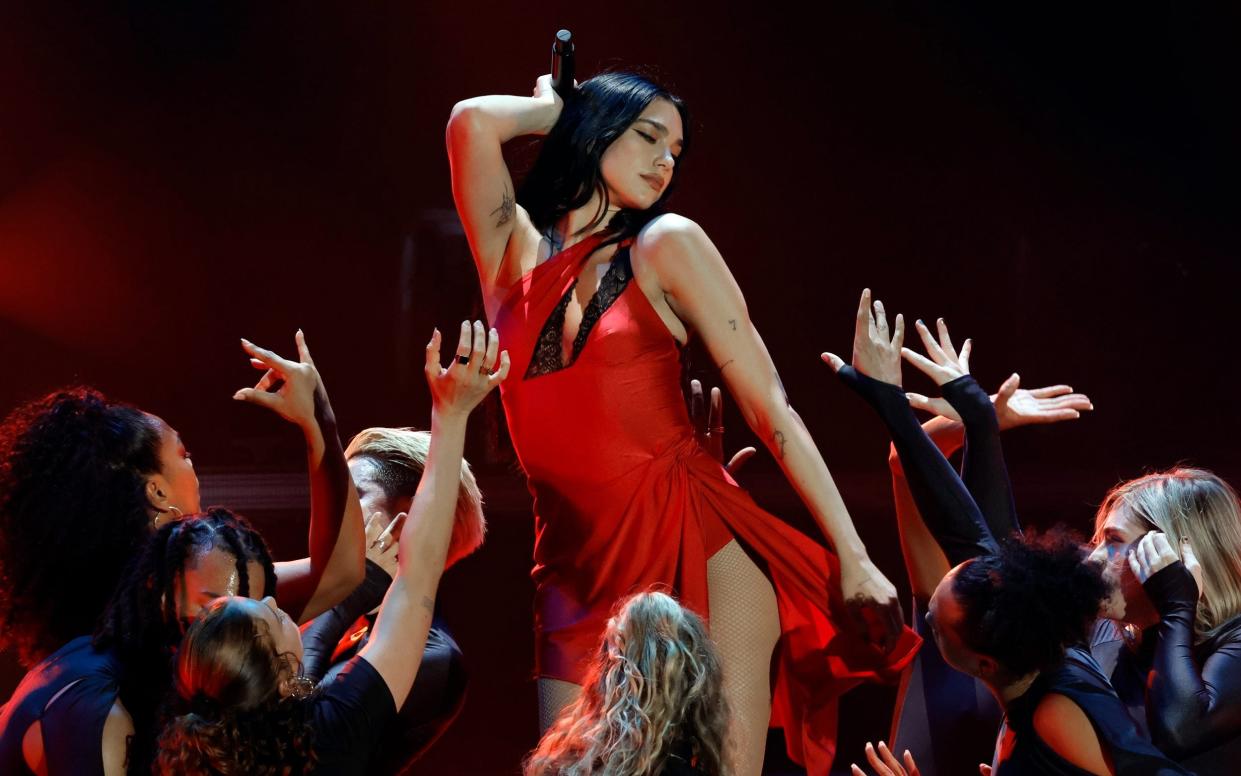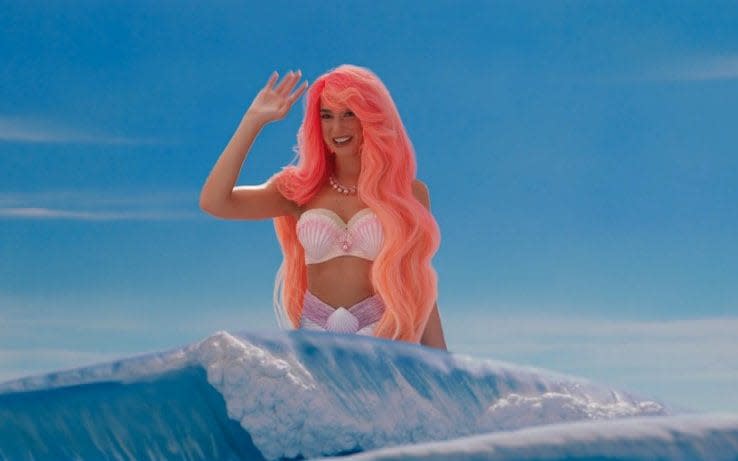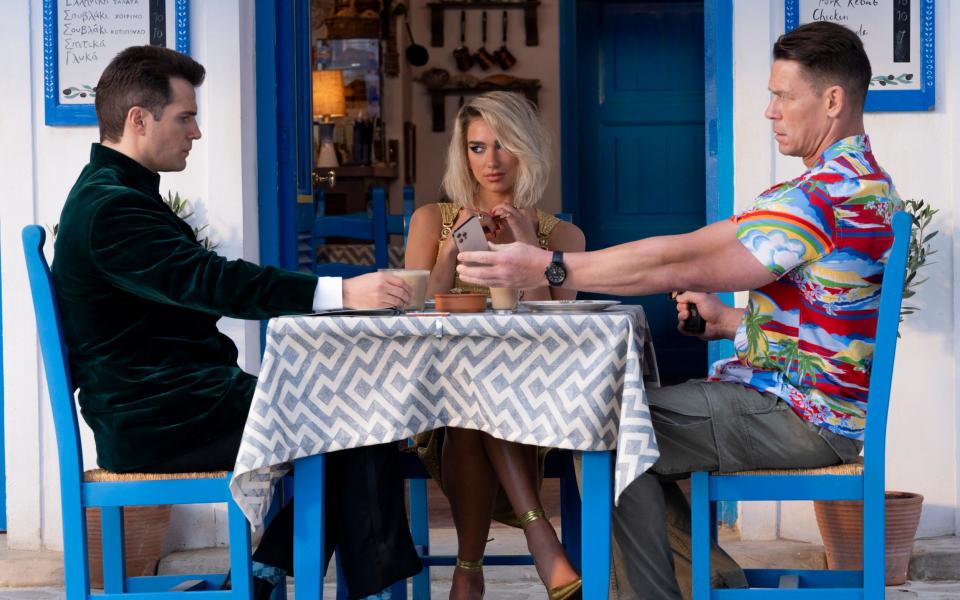What explains Dua Lipa’s inescapable rise? Lockdown, a Madonna-esque work ethic – and her ‘Dadager’

On Friday evening, when Dua Lipa steps onto Glastonbury’s Pyramid Stage, she will be fulfilling an ambition that, as she said recently, “I’ve been dreaming about my whole life. Every time I write a song, I think about how this is going to sound at Glastonbury. That’s my barometer.”
For her legion of admirers, Lipa is the shining British star of our times; a purveyor of 21st-century dance-pop perfection, fashioned from propulsive beats, gleaming vocals, soundbite-friendly lyrics, high-gloss imagery and athletic choreography. For her detractors, there is the suspicion of something blank at the centre; a lingering question about whether she represents anything more than a major record-company project that’s all machine and no soul, engineered for world domination at all costs.
Either way, to those who know the 28-year-old homegrown superstar, a headline slot at the greatest festival on Earth feels like her inevitable next step on an apparently unstoppable rise to the top. “The first time I met Dua, she had an energy that felt bigger than the room,” says Joe Kentish, who gave the 19-year-old her first record deal in 2014 and is now president of Warner Records UK. “She was a huge presence from day one.”
In the decade since, Lipa has become one of the most prominent hitmakers of our times, picking up seven Brit awards, three Grammys, billions of streams on Spotify and 88 million Instagram followers along the way. She has recorded with household names from Elton John to Madonna, Kylie Minogue to Miley Cyrus. Last year, she made her big-screen debut as a mermaid in the record-breaking blockbuster Barbie – for which she also provided the inescapable soundtrack hit Dance the Night – followed (less auspiciously) earlier this year by a more substantial role in Matthew Vaughn’s box-office flop Argylle.
Lipa also has her own production, publishing and management company, Radical22. She hosts a podcast (At Your Service) and runs a book club via her website, Service95, which she describes as a “global style, arts and society venture – the ultimate cultural concierge”. There are clothing lines, accessories and all manner of brand deals. The music-industry website Chartmetric ranks Dua Lipa as the 14th most-popular artist in the world right now. Significantly, she is the only new British pop star of the past 10 years to have achieved this kind of global recognition.

Lipa was born in London, in August 1995, the eldest of three children, to an immigrant couple who had fled the Kosovan capital Pristina in 1992, amid growing ethnic conflict. Her father, Dukagjin Lipa, had been both a dentist and a rock star in a popular local band called Oda, but on arrival in Britain, he worked in service jobs while retraining in business and marketing. Her mother, Anesa, was a qualified lawyer who resorted to waiting tables while here to help support the family. This story is at the core of Lipa’s identity, referenced in every interview she gives.
Yet when the family moved back to postwar Pristina in 2008, she found it too small to accommodate her teenage ambitions. “I felt the only way I could do anything on a global scale was if I went back to London,” she would tell Hunger magazine in 2017. And so, aged 15, Lipa returned to the UK alone, and lived with a family friend while she completed her A-levels at Parliament Hill School, in Camden, and took classes at the Sylvia Young Theatre School (whose alumni have included Rita Ora and Amy Winehouse).
This is the moment that the steely determination which has characterised her subsequent career appears to have kicked in. “When I realised that no one was going to tidy up after me, or clean my clothes, that’s when I thought, ‘S---, I’m really on my own here,’” she has said. “I figured it out, though, and when I learnt how to do the cooking, cleaning and work the washing machine, it hit me that I could try and do my music on my own, too.”

She began posting videos of herself singing cover versions on YouTube, worked as a cocktail waitress, did some modelling for Topshop and sang on a 2013 television ad for The X Factor. That same year, she caught the eye of Ben Mawson and Ed Millett of TaP Music management, who had recently helped make a huge success of Lana Del Rey. “From our first meeting, Dua struck us with her ambition,” the duo tell me via email. “Whatever the vision a manager might have, the artist needs to be committed to the work it takes to achieve it, which Dua absolutely was.” TaP paid Lipa a salary, arranged sessions with writers and producers, “helped assemble a team of specialists around her” and negotiated a deal with Warner, the smallest of the UK’s three major record labels, home to Ed Sheeran and Coldplay.
From the off, Warner backed its new signing to the hilt. “I know it sounds a bit of a romantic notion, but we all believed in her,” says Jeremy Marsh, head of international at Warner UK from 2013 to 2021. “We took her to pretty much every region in the world. You can wear an artist out on promotion – it’s like pushing an athlete to that ultimate level of fitness – but she had a Madonna-esque work ethic. She had this game face she could put on however exhausted.”
There was a sense at the time that Dua Lipa was too big to fail, even as Warner poured millions into a career that was proving slow to take off. “There was definitely a point where the investment became huge,” says Kentish, “but there were things happening that justified carrying on that spend; she was always able to create little sparks of interest.” Lipa had minor hits, but there were flops, too, songs that stalled outside the top 50.
Then, after two years and eight singles, she released New Rules, a smart girl-power song set to a tropical house beat. Composed by a team of three, it had already been rejected by multiple artists, including the girl group Little Mix, before it was offered to Lipa. “The lyrics immediately struck a chord with her,” says Kentish. “She was very reluctant to sing anything that sexualised her. She had an empowered female attitude that is easy to talk about, but harder to make into a catchy pop song. New Rules crystallised it.”
The release of the song in the summer of 2017 – which went to number one in the UK and gave her a top 10 hit in America – marked the moment Lipa caught the zeitgeist. A witty accompanying video went viral, scoring more than three-billion views on YouTube. “I asked if the director had come up with ideas for that,” says Kentish, “and Dua showed me a mood board that she’d made two years before, and it was basically that video.”
Talking to people around Lipa, this is the kind of story you hear a lot. She fills notebooks with ideas and references, covering everything from food to fashion, film to music, pop to politics. She is ruthlessly organised: a planner on her phone divides each day into 20-minute segments, which take her from brushing her teeth through a packed schedule of creative and business activities. “You will never outwork Dua,” says Caroline Ailin, a co-writer of New Rules and one of Lipa’s most trusted collaborators. “I don’t know anyone with that busy a calendar who still manages to always be on time. Like, we’re talking to the minute. She’s a perfectionist, for sure. She wants to go over everything in detail and make it as great as it can possibly be.”
Lipa was already shaping up to be the UK’s most significant new pop star when her second album, 2020’s Future Nostalgia, became a pandemic phenomenon, notching up more than five-million sales and spawning a fistful of global hits. Lipa’s live-streamed lockdown concert Studio 2054 was seen by more than five-million people in more than 150 countries. “I called her the queen of stay-at-home pop,” says Brian Hiatt, a senior writer at Rolling Stone magazine. “When all the rules changed, she was very savvy about doing Zoom interviews and streaming performances. The Dua explosion really happened whilst we were all stuck at home.”
Then, right at this moment of triumph, something happened that, even now, nobody involved seems eager to explain. Just as Lipa was about to embark on her pandemic-postponed Future Nostalgia arena tour in February 2022, it emerged that she had separated from TaP management. In a settlement negotiated over the course of a year, Lipa bought back the rights to her back catalogue, and installed her father at the helm of her own new management company, referring to him affectionately as her “Dadager”. At that point, Dua Lipa’s net worth was estimated by The Sunday Times to be £36 million.
TaP have remained diplomatic about the split. “They say hard work beats talent, but Dua had both, which is a powerful combination. We’re incredibly proud of all we achieved together,” they tell me. A senior artist manager at a rival company, who does not wish to be named, takes the view that, “When huge amounts of money start pouring in, things change, people start making different decisions. It’s not unusual for an artist to change managers, but it always makes the industry nervous.”
While acknowledging that “Ben and Ed were great managers, very determined, very impressive,” another industry insider strongly defends Lipa’s father’s credentials. “It’s not like she’s gone with a rival management company. Her father was her first supporter, who has backed her 100 per cent all the way, before the management deal, before the record deal. He’s always been very important in this mix. What Dua’s done is detach one set of rockets, but the engine is still there.”
By any reckoning, 10 years into her career, Lipa is a huge success: her net worth has increased to an estimated £90 million, placing her 29th in the Sunday Times list of the 40 wealthiest Britons under 40 years old. She is the owner of an airy, modern £2 million home in Studio City, Los Angeles, and a £7 million house in West Hampstead, London, close to where she grew up. She is currently in a relationship with Callum Turner, the British star of the television drama Masters of the Air.
Last month, Lipa’s third album, Radical Optimism, debuted at number one in the UK and nine other countries, and reached number two in the US. Yet it hasn’t had the impact of Future Nostalgia, and doesn’t seem to be generating hit singles. “Let’s wait and see,” says Kentish, shrugging off concerns. “All of her records have been slow-builds. She’s obviously super-ambitious, but she approaches each record trying to be original and interesting, there’s never been some sort of cynical chart ploy. Dua’s in it for the long run.”

Hiatt’s view is that Lipa has “become a global superstar, but one level below the top rank. This album’s definitely had a mixed reception. The criticism has been that it’s a little bit samey. When you meet Dua, she’s political, she’s smart, she’s a reader, but she’s not a tortured artist, and there’s no intersection with her own life and her music. There’s just not that much to hang onto.”
In interview, Lipa tends to be deflective, preferring to keep things superficial. On Instagram, she posts countless bikini selfies, taken in exotic locations, or brand-affiliated posts with anodyne messages, such as, “so happy to share that i am the new make-up ambassador for YSL beauty 🖤 [sic]”. If you want sleek electro-techno songs about dumping bad boyfriends, dancing with prospective beaux and having torrid sex with unsuitable men, then Radical Optimism is for you – but there’s no unfiltered emotion here, nor anything to reflect her apparently highbrow reading tastes.
“But, you know, when she identifies weaknesses, she corrects them,” notes Hiatt. “And if people are pointing out the lack of deeper substance in her music, she may well inject that next time.”
Headlining Glastonbury may have been one of Dua Lipa’s ultimate goals, but Friday’s performance is unlikely to represent the culmination of her career. The secret to achieving enduring success in this business is, says Kentish, “about actually being unafraid to do things, to grasp opportunities, to put in work when maybe the feedback isn’t great, and to have such self-belief that when things don’t go your way, you double down. Her actions show that Dua is unafraid.”
Watch Dua Lipa at Glastonbury on BBC One from 10.30pm on Friday

